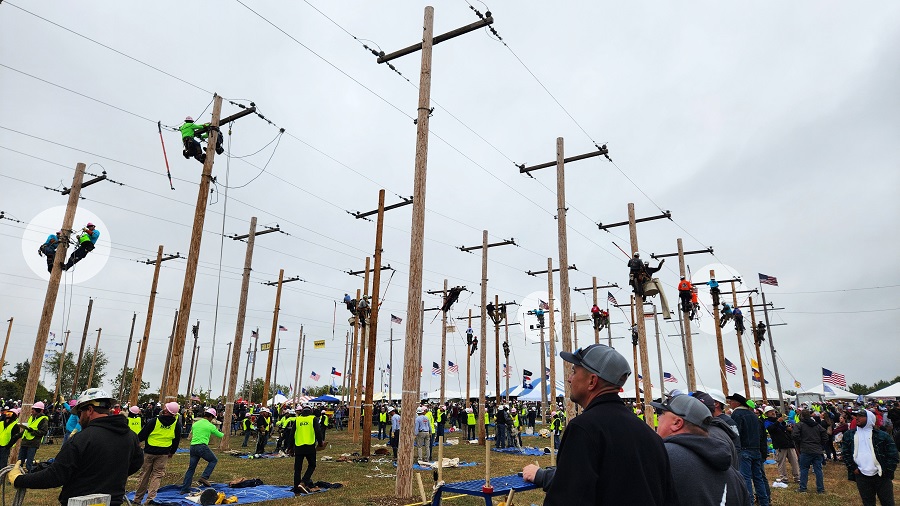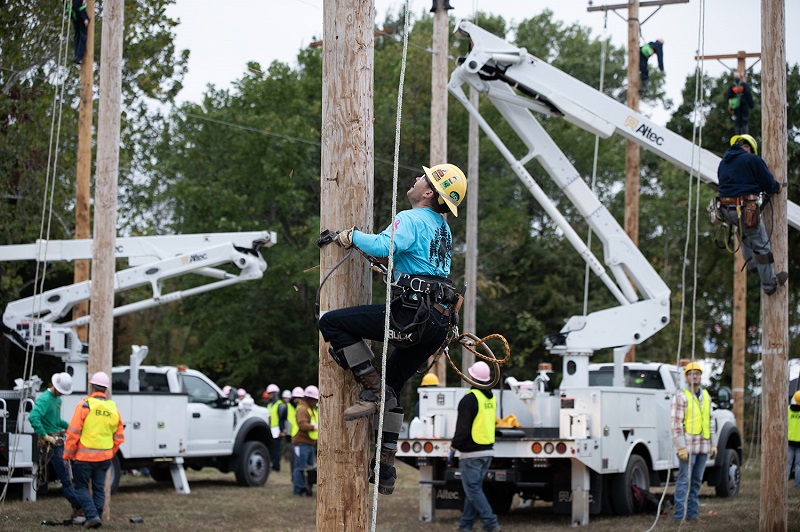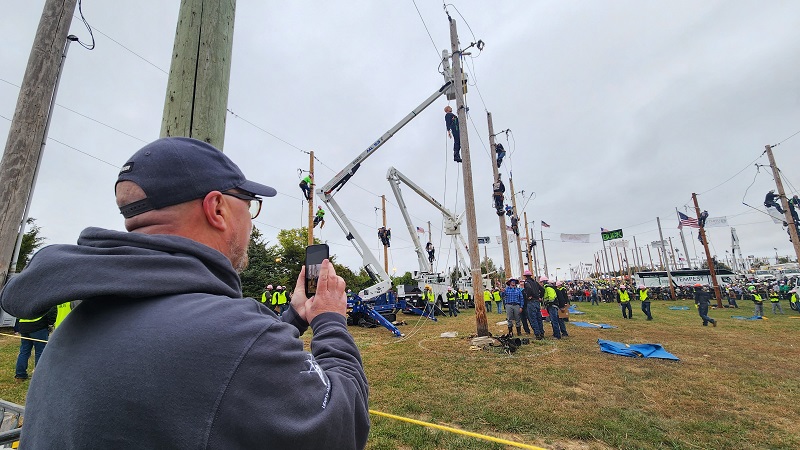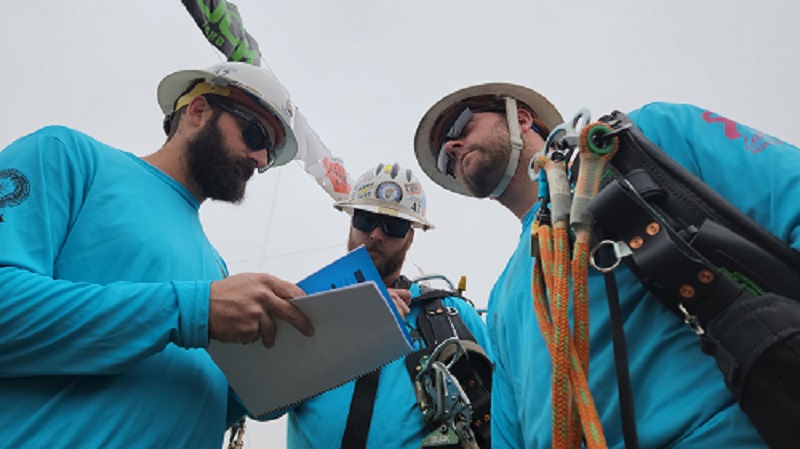It’s a chilly, misty October morning on the grounds of the National Agriculture Center & Hall of Fame in Bonner Springs, Kansas – the weather adding a touch of solemnity to this particular moment.
“Look to your left … now look to your right,” the emcee asks of those gathered for the opening ceremony. “See who is next to you and realize you are your brother’s keeper.”
There is a moment of silence for those who have lost their lives or been seriously injured while on the job. It’s followed by a performance of “The Star-Spangled Banner,” and recordings of the national anthems of Canada and Brazil.
And with that, the 39th annual International Lineman’s Rodeo (ILR) is underway, the atmosphere suddenly charged as the speakers begin to blare the opening chords to the Rolling Stones’ “Start Me Up” and the more than 1,300 lineworkers begin heading toward their first event of the day. The crowd of line crews wearing hard hats and game faces while lugging equipment across the grounds include Liberty teams (six three-person journeyman teams and six apprentices) from Missouri, New Hampshire, and California.
The competition is the culmination of four days of activities and is the premiere event of its kind – think of it as the Olympics for electric utilities. The best of the best are here to showcase their skills across a series of events designed to test their knowledge, and ability work efficiently, and, most importantly, safely.
Bragging rights, safety, and family
“My crew is better than your crew.”
That’s how the annual Lineman’s Rodeo began back in 1984, says Dennis Kerr, Chairman of the Board of Directors for the ILR. It was all about bragging rights between 12 teams from Missouri and Kansas.
“We had a few years where we maybe had a few hundred competitors, but we kept growing and now it’s an international event,” he says. “Last year, we had almost 1,200 competitors. This year, our biggest yet, we have 1,354 competitors. That breaks down to about 294 journeyman teams and 400 apprentices.

Liberty teams from Missouri, California, and New Hampshire can be seen competing in an event at the International Lineman's Rodeo on Oct. 14.
“One of the biggest parts of this is the expo at the Overland Park Convention Center. It has the latest and greatest when it comes to tools, safety equipment and more. All day on Wednesday and half the day Thursday was our safety conference, and we brought in some top-quality speakers.”
Another aspect of the ILR that Kerr takes pride in is that so many families attend to cheer on their loved ones.
“We promote it as a family event,” he says. “It’s the best thing in the world to have families come out and see what their moms and dads do for a living. It’s always so much fun.”
The organization plans several kid-friendly activities and this year offered train rides, bounce houses, and a petting zoo. At the hundreds of company tents lining the grounds of the competition, many children could be seen playing or grabbing a bite to eat between events.
Landon Baker, a journeyman lineman from Joplin, Missouri, competed as an apprentice in 2019. For his trip to the competition this year, he brought along his wife and three young daughters.

Matt Suver, a Liberty apprentice from Missouri, competes in the Hurtman Rescue event.
“It’s awesome,” he says of having his family there to cheer him on. “They enjoy the atmosphere, the food, the friends, and the comradery of it. They’ve got a train and other activities for kids, and they like getting to see us compete.”
The best of the best
Neil Proudman, Liberty’s President of New Hampshire, says the competitive aspect of the event is important.
“Last year was my first visit to the rodeo,” he says. “The one thing that really struck me was the opportunity for our lineworkers to take their place among the very best in the industry. A little bit of competition is always a good thing. It’s good for the crews, it’s good for morale. The best of the best in the country are here, and there’s every reason we should be here as well.”
Team events for 2023 included the two standing events: Hurtman Rescue, in which three-person teams “rescue” a 180-pound mannequin standing in for an injured colleague; Pole Climb, which involves bringing a basket containing an egg to the top of the pole and bringing the egg down in their mouth without breaking it (“Some competitors accidentally have an egg for breakfast,” says Kerr); and two mystery events. Apprentice events also included a solo Hurtman Rescue and Pole Climb, two mystery events, and a written test.

Liberty New Hampshire President Neil Proudman FaceTimes an event at the International Lineman's Rodeo so that a Liberty lineman's family can watch him compete.
This year’s mystery events included jumper and crossarm changeouts, attaching a guy wire between poles for stabilization, and changing out an arrestor used to limit electrical surges.
“The mystery events really do test you,” says Rick Blake, a Liberty Crew Leader from Salem, New Hampshire. “You really have to know the difference between preparation, memorization, and really understanding the work you do.”
A clean run
Each team or apprentice starts with 100 points and must try to complete the job as quickly as possible, while trying to avoid mistakes which can mean point deductions.
For instance, a Liberty journeyman team of Cody Berry, Aaron Bittle, and Landon Baker from Joplin, Missouri, ranked 19th out of 292 teams in Hurtman Rescue, a clean run (meaning no point deductions) with just over 20 seconds separating them from the top five. Matthew Suver, from Missouri’s apprentice team, missed out on the top five in the same event by a tenth of a second.

Liberty linemen Kyle Baker, Calen Davis, and Gabe Lozano from South Lake Tahoe, California, review the competition guidelines before the Hurtman Rescue event at the International Lineman's Rodeo.
Davis, stepping off the competition field after his team made a clean run in the Hurtman event, says that win or lose, preparation for the annual rodeo is a good way to stay sharp while on the job.
“It’s a great way for us to practice thinking ahead about how we’re going to make moves,” he says. “It’s especially good for apprentices, in my opinion, because it gets them thinking about the job ahead of them and forces you to practice and get more comfortable climbing. And for journeyman, it makes you a little better. It’s great training and gets you in better shape.”
